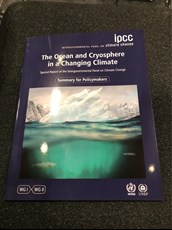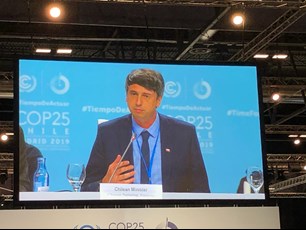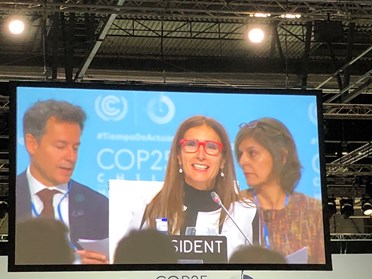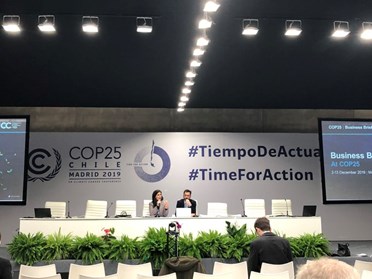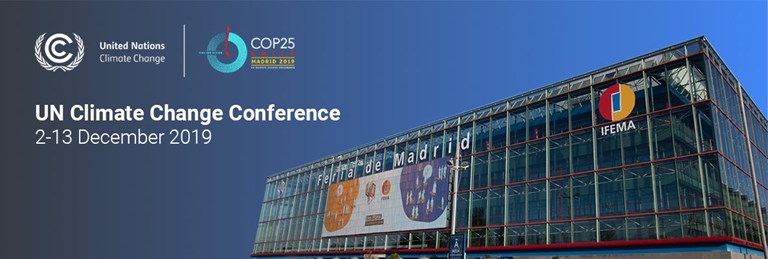
Energetics was on the ground representing Australian business and industry at COP25 in Madrid from 2 - 13 December 2019. 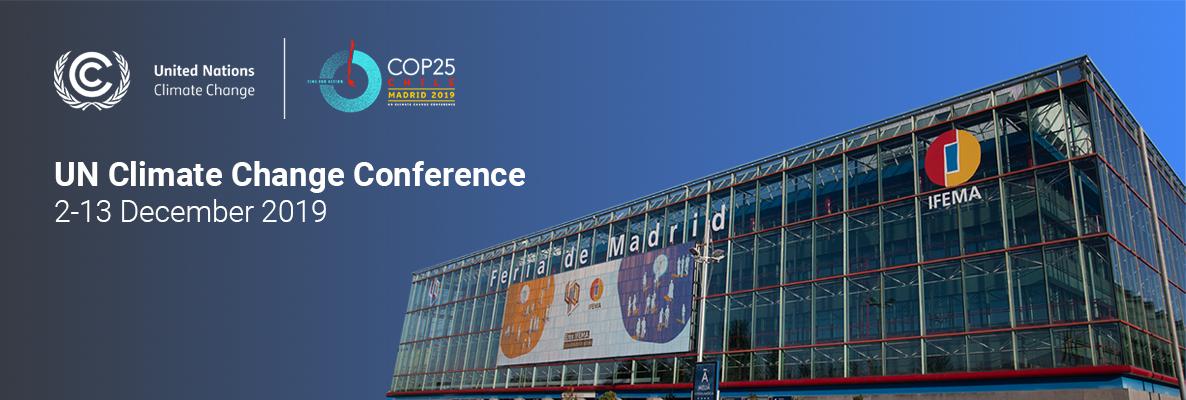
CEO of Energetics, Dr Mary Stewart, and General Manager - Policy and Strategy, Dr Peter Holt attended UNFCCC's 25th Conference of Parties (COP25) which was expected to deliver on several matters related to the full operationalisation of the Paris Climate Change Agreement.
Both Mary and Peter reported their observations from the COP25 proceedings via social media and on this page, with highlights included below.
Day 11 - Thursday 12 December, 2019
Ambitious announcements (but not from Australia)
As Greta Thunberg is named Time's, person of the year, the youngest ever to do, we turn our focus to where the action and ambition is occurring.
EU and Canada to be net zero by 2050
The European Union's new commission president, Ursula von der Leyen announced EU's intention to be net zero by 2050. The first continent to do so. The "European Green Deal" is a comprehensive approach to restructure the European economy with the overall aim of economic growth and increasing prosperity.
Beyond the net zero by 2050 headline, key elements of the deal include:
- Emissions reduction by 50 - 55% by 2030 from 1990 levels
- A new climate law will be introduced by March 2020
- Trade deals only with countries that stick to their climate targets under the Paris Agreement
- Carbon border tax to protect EU businesses from non-EU competitors commencing in 2021
- Creation of the 100 billion euro "Just Transition Fund" to assist EU members transition away from fossil fuels
- Green investment directing the European Investment Bank (EIB) to dedicate half of its investment to climate finance by 2025
Discussions are currently underway in Brussels to ensure unanimous agreement.
A growing number of economies are aiming to be net zero by 2050
Canada has recently pledged to introduce legislation for net-zero carbon emissions by 2050. Additionally, over fifteen countries have adopted net zero targets including Fiji, France, Japan, New Zealand, Noway, Sweden, Switzerland and the United Kingdom.
Furthermore sub-jurisdictions are increasingly committed to net zero emissions by 2050 including California, Hawaii, New York, New South Wales, Queensland, ACT, Victoria, South Australia and Tasmania.
But not everyone is being ambitious - notably the US and Australia.
What are businesses doing?
Businesses were present, particularly throughout the side-events. The key topics of discussion were the creation of a "new" carbon market (Article 6) and the degree of ambition.
Paul Polman clearly articulated the three main actions for businesses;
- Align with a 1.5 degree goal
- Zero net emissions businesses
- Just transition to ensure future jobs
He highlighted the Climate Ambition Alliance which demonstrated the commitment from the corporate sector to net zero by 2050.
John Denton, Secretary General of the International Chamber of Commerce (ICC), reiterated the need for a bold narrative, global policy and mass mobilisation to achieve a 1.5 degree goal.
Investors seeking action
631 investors with $US37 trillion in assets under management signed the Global Investor Statement to Government on Climate Change which called for governments to:
- Achieve the Paris Agreement goals
- Accelerate private sector investment into low carbon transition
- Improve climate-related financial reporting
Article 6 progressing slowly
Article 6 bogged down in process - being elevated to Ministerial conversions. New Zealand and South Africa (the co-chairs) are leading facilitation for the parties. During the COP Presidency briefing today, the New Zealand Minister provided a brief update highlighting that whilst there was consensus on many issues, there had been little progress on the key issues (double counting, carryover and share of proceedings). Further bilateral discussions will be held with decision makers today and tonight, with an updated version of the text expected Friday morning.
As the bleary eyed negotiators persevered through to the end of the week, there is still much work to do (particularly around Article 6).
All we want for Christmas is Article 6 (and yes there is a badge).
Looking ahead
Needless to say, the call for increasing ambition to limit global warming to 1.5 degrees was clear. Business has heard this call and is allocating capital accordingly. Economies are transitioning to net zero. The momentum is gaining. History will tell who "wins" and who "loses".
Day 10 - Wednesday 11 December, 2019
Strong messages from scientists
The science is clear
Scientists are making their presence known, united in their message and clear on their projections. In fact, this is the "blue COP" referring to the COP's focus on oceans.
IPCC Special Report on the Ocean and Cryosphere in a Changing Climate
The IPCC released a Special Report focusing on the impact of climate change on oceans and the cryosphere. The Oceans cover 71% of the planet's surface and contain the bulk of our water (97%). The cryosphere is the frozen component of the planet's system, with approximately 10% of Earth's surface covered by glaciers or ice sheets. The Earth system is complex with a multitude of interactions between water, energy and carbon - all supporting communities. The Special Report highlights:
- Global warming has led to widespread shrinking of the cryosphere including mass loss from ice sheets, reduced snow cover, reduced Arctic sea ice (extent and thickness) and increased permafrost. These trends are expected to continue due to surface air temperatures.
- Global mean sea level is rising with acceleration due to increasing rates of ice loss from Greenland and Antarctic ice sheets. Further losses of these ice sheets are expected.
- Over this century, the ocean is projected to transition to unprecedented conditions with increased temperatures, greater upper ocean stratification, further acidification and oxygen depletion. Extreme El Nino and La Nina events will occur more frequently.
- Coastal communities are exposed to multiple climate related hazards including extreme sea levels, with the frequency of high water events increasing. These impacts will increase impacting low lying coastal areas.
- A decrease of global marine animal communities, decrease of fisheries catch potential and shift in species are projected. Decreased fish production will impact income, livelihoods and food security of associated communities.
It is clear that our oceans and cryosphere is reaching a tipping point, with limited ability for further adaptive response with "ecosystem-based adaptation will only be effective under the lowest level of warming".
Strong reductions in greenhouse gas emissions, that is aligned with a 1.5°C goal, will limited the magnitude of expected changes and reduce further changes after 2050. Yet another recently released report, the UN's emissions gap report, highlights the global challenge.
UN emissions gap report 2019
The UN recently released the annual emissions gap report highlights include:
- Greenhouse gas emissions are on the rise and have been rising at an average rate of 1.5% per year over the last decade. There is no sign of emissions peaking in the next few years.
- G20 countries (which includes Australia) are responsible for 78% of global emissions
- Australia relies on carry over credits to achieve our 2020 target and will require more action to achieve our NDC
- To achieve the 1.5°C goal, emissions must be reduced by 7.6% per year from 2020
The report then highlights that significant global restructuring is required to achieve these outcomes, highlighting the role of renewable energy, energy efficiency and electrification for heating, mobility (electric vehicles) and decarbonising emissions-intensive industries (of which we have a few) are all critical for success.
Check out the interactive visual and the report.
The message is clear
Our global scientists are clear that we have reached a tipping point with our oceans and the cryosphere is suffering. This impacts us. From extreme sea level events to reduction in fisheries, our coastal communities will be impacted. Yet we can limit future impacts by limiting global warming to 1.5°C - this is our goal.
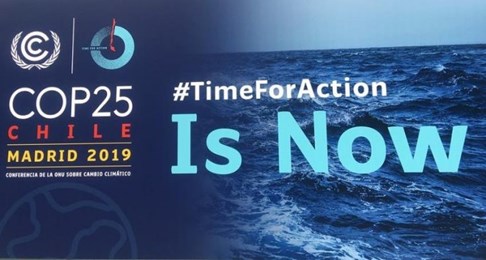
Day 9 - Tuesday 10 December, 2019
COP25 Madrid - Still in the throes
As we enter the second week of the COP25 negotiations, a weary and bleary group of delegates have emerged. Tuesday has just concluded here with little tangible progress on the key element - Article 6 - the market based mechanism.
Article 6 crawls along
Monday night stretched into the wee hours, with negotiators still hard at work until 2am. It was a frustrating day for them with little change to the draft text that was produced by the technical working groups over the weekend. This non-consensus text has been forwarded to the COP President for distribution to Ministers, effectively elevating the discussions from the officials to the Ministers.
Key areas for resolution still remain around:
- transition from the Kyoto Protocol to the Paris Agreement and the associated complexities. Ending one scheme, transitioning to a new scheme and avoiding a gap between the two schemes. Then the corresponding adjustments for sales, accounting and retirement
- establishment of baselines for proposed activities under the new mechanism
- provision of carry-over credits from the Kyoto period
- dealing with overall mitigation in global emissions (OMGE), effectively avoiding double counting and determining what contributes to a NDC and/or voluntary action
- the link to Article 6.8, non-market based mechanism clause. Why the link? Effectively the ability to transfer to an activity back to Article 6.8 if it does not meet Article 6.2 or 6.4 criteria
All with the aim of developing a robust market based mechanism that delivers additional and credible emission reductions.
The next phase has now been elevated to Ministerial level, This effectively elevates the discussion to a political discussion between the parties.
Minister Angus Taylor arrives
Minister Taylor arrived earlier in the week to lead Australia's negotiations. Speaking at a event on Monday night, Minister Taylor reinforced the Morrison Government's position.
Interestingly, Minister Taylor announced Australia's intention to join the "Transition Initiative" focusing on hard to abate sectors. Along with India and Sweden, this group will be focused on technological solutions for abatement. Minister Taylor is committed to Australian industry, the workforce behind these industries and the technological solutions that can abate emissions for these industries. It remains to be seen what this means in practical terms with the Climate Solutions Fund (CSF) and enabling agencies (ARENA and CEFC) expected to play a role in adopting a wider range of technologies to support a transition to a zero net carbon economy.
What happens if we don't get agreement?
Negotiations are expected to go down to the wire this week. Our delegates will be working hard to ensure any outcomes are robust and dependable. If consensus is not reached, then the discussions will continue next year at COP26 in Glasgow. And in the absence of an agreed rule book, global carbon markets will be in limbo.
Day 7 - Sunday 8 December, 2019
By the numbers
What is really sticking with me at the moment is the numbers that are coming to the fore:
- zero emissions by 2050, that’s so far that we sort of can’t engage
- 50% reduction in emissions by 2030, that’s pretty soon, and it seems like a really big ask
- 7.6% reduction year on year for the next ten years, that’s huge.
And it only takes one party to change the text.
Which is why the Gandhi quote is so important, be the change you want to see. Every action counts, and there is great urgency.
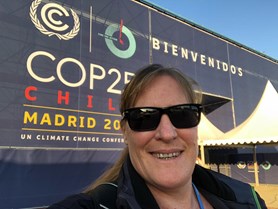

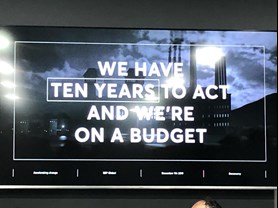
Day 6 - Saturday 7 December, 2019
You have to feel for the negotiators
The negotiators have been under huge scrutiny as we anxiously watch them argue so politely with each other about what seems to be the most trivial things. We really need progress on Article 6, we really need ambitious emissions reductions, we really need to start adapting to a changed environment and they are arguing about a phrase or a word. But remember that they can only negotiate in line with what they have been told to do by their governments. They are professionals and they are doing their jobs to the best of their abilities. And yes, Australian negotiators are looking to carry Kyoto credits into the Paris Agreement period which we don’t want, by they are as vigorously arguing that Article 6 remain strong on human rights. The American delegation will no longer be in the room next year, but they will argue for a clear and transparent Article 6 until their very last day in the Agreement. The Paris Agreement is just that, it is an agreement, it is not a majority decision, all the parties in the room have to agree to every word in the text. I am glad they are here to do their jobs, I don’t envy them this role at all.
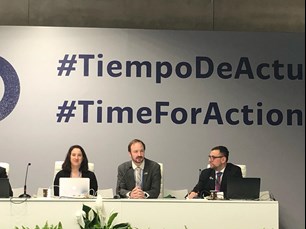
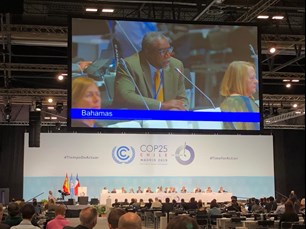
Day 5 - Friday 6 December, 2019
The workshop on adapting to a world where the water has run out really highlighted the need humanity has to adapt to a changed environment. We have temperature certainty, the world will never be the same again. The Business sessions start out well highlighting the risks and recognising that we need to change, but all the transition that is spoken about is how to get out of emissions, how to limit and stop emissions. This absolutely is an imperative, and the sooner the better, waiting for 2050 to roll around is too late.
However, the other side of managing your climate risk is adapting to a changed environment. The Standing Committee on Finance of the UNFCCC has shown that we need to spend equally on mitigating emissions and adapting to a changed environment. The business community is missing half of its risks, and thus also half of its opportunities. TCFD (Task Force on Climate-related Financial Disclosures) and SBT (science-based targets) are enough on their own, adaptive response plans need to be built too.
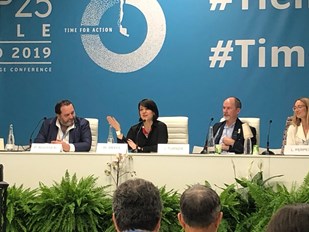
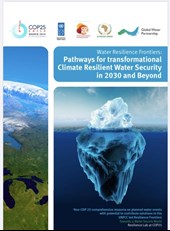
Day 4 - Thursday 5 December, 2019
Such divergent views on everything
Today seemed to be one of contrasts, the three which I have really noticed are:
a) just how scary the IPCC forecasts for Oceans and Cryosphere are, and in contrast to the Land report, there is no relief or mediation of the risks through changing how we farm for example, all was can do is reduce emissions a lot and fast.
b) how many people here want to talk ambition, this is the focus of the Chilean presidency of the COP, when really all I am hoping for is an Article 6 resolution which is not too weak.
c) business would like a resolution on Article 6, even if it’s weak, civil society feel no deal is better than a bad deal.
Time will tell where we land on the last two, and really we just need to act, because we are running out of time. Hopefully the next week of the COP resolves some of these.
Day 3 - Wednesday 4 December, 2019
It’s starting to feel like I’m in a bubble
You get to that point in the COP when you start to feel like all the players are doing what they are supposed to inside their own little bubble, a bit like the pro-nuclear pandas inside their inflatable suits. But COPs are always there to surprise.
The first people operating outside their bubbles seem to be the IPCC who are speaking more clearly about what they do and how. It was refreshing to understand their aims to not be policy directive but to be policy relevant. The care taken in their approach to ensuring diversity in their authors was great to hear. A clear value add to the UNFCCC process and a group of people who work really hard to deliver great work. Their special report on Land discussed in a shared session with the SBSTA today is a case in point.
The other bubble that seems to be changing shape is the negotiation process for Article 6. To be fair the same people have been arguing and disagreeing about the same stuff for two years so it was refreshing to hear that they are trying a new approach to informal informals, hopefully it will deliver a clean set of options to the presidency on Monday as planned. The negotiators seem very invested in delivering a result this time. timeforaction
Day 2 - Tuesday 3 December, 2019
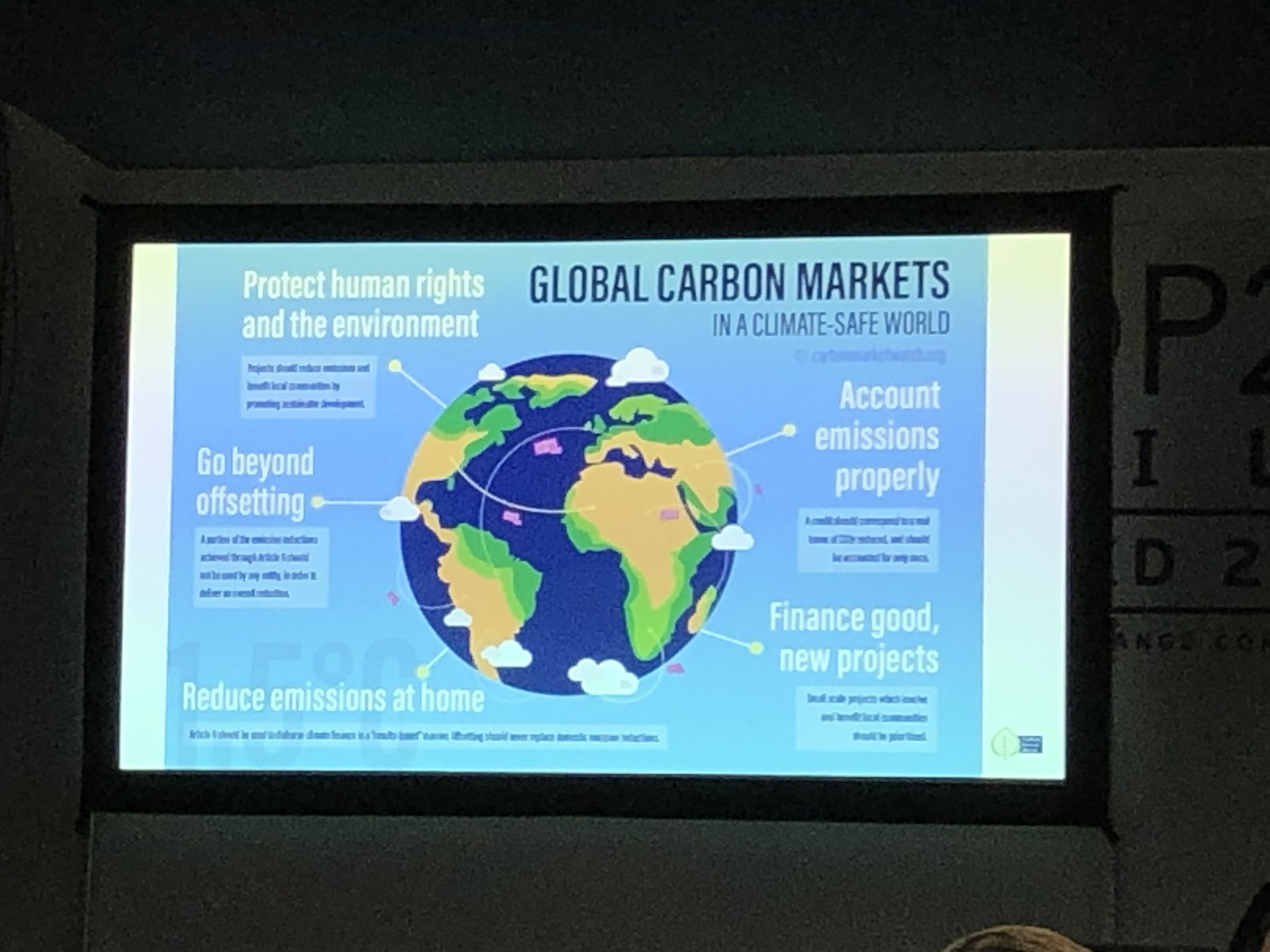
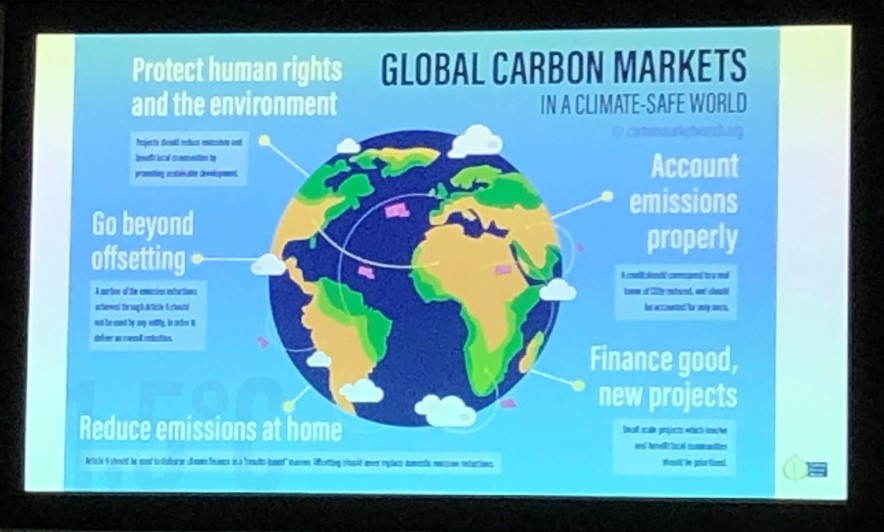
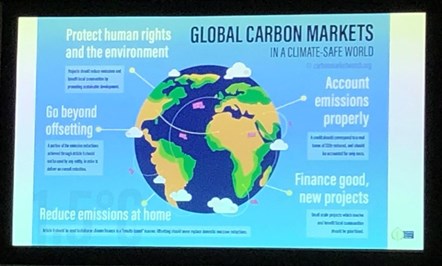
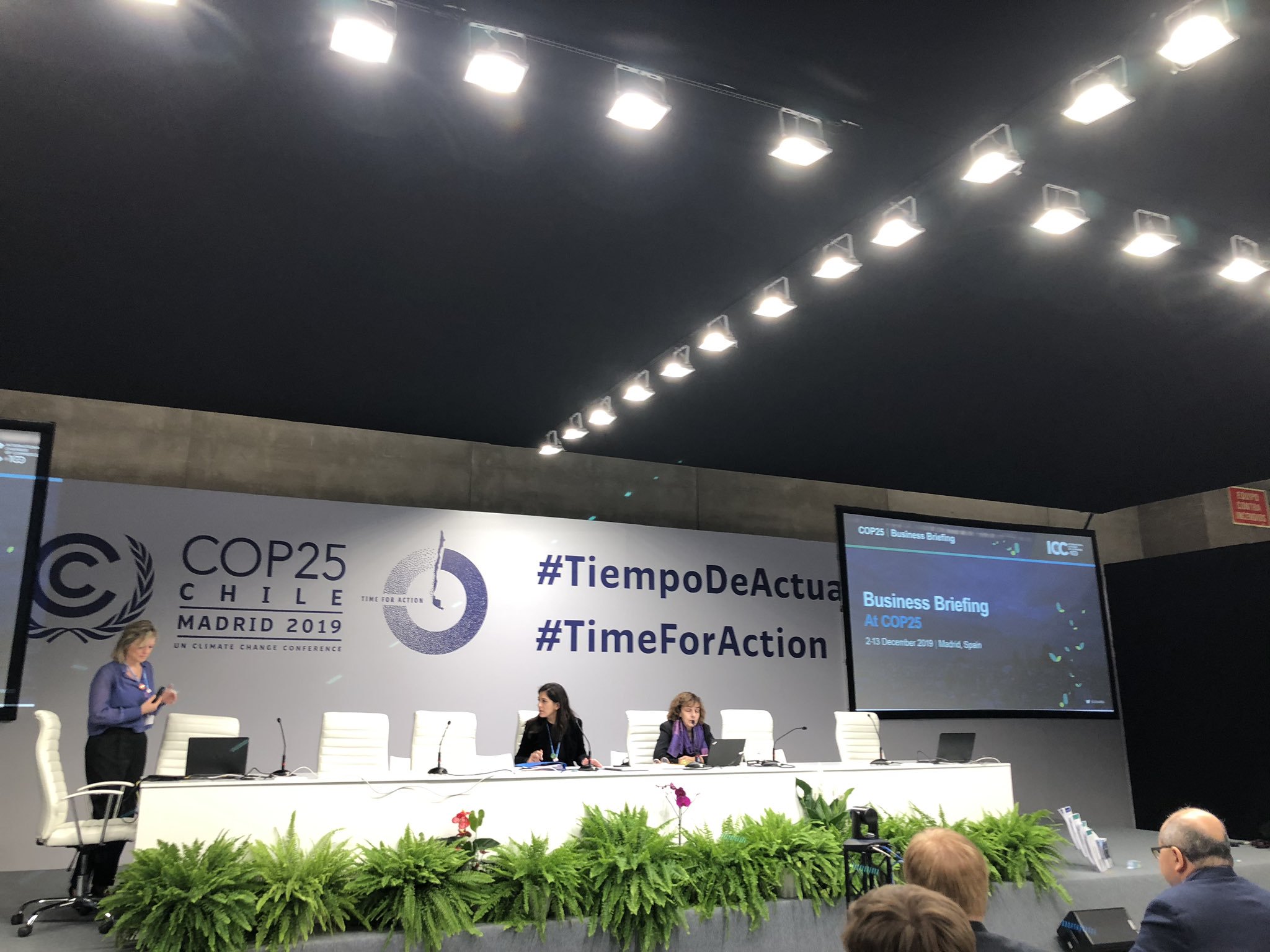
- Watch out for the European new Green Deal in 10 days, which will encode the transition to carbon neutrality into law; will include consideration of trade adjustments.
- A lot of current NDCs were rushed and need more work, they have the opportunity in the next year to enhance quality in these NDCs and increase ambition. Aiming to set countries up for long term success. 65 countries have requested help so far. Limited number of countries with plans (3% with real plans, 24% considering) for increasing ambition in NDCs.
- Climate action is being linked with responses to SDGs and a focus on equality. Countries are improving data, developing targets and embedding NDCs in long term strategies and plans.
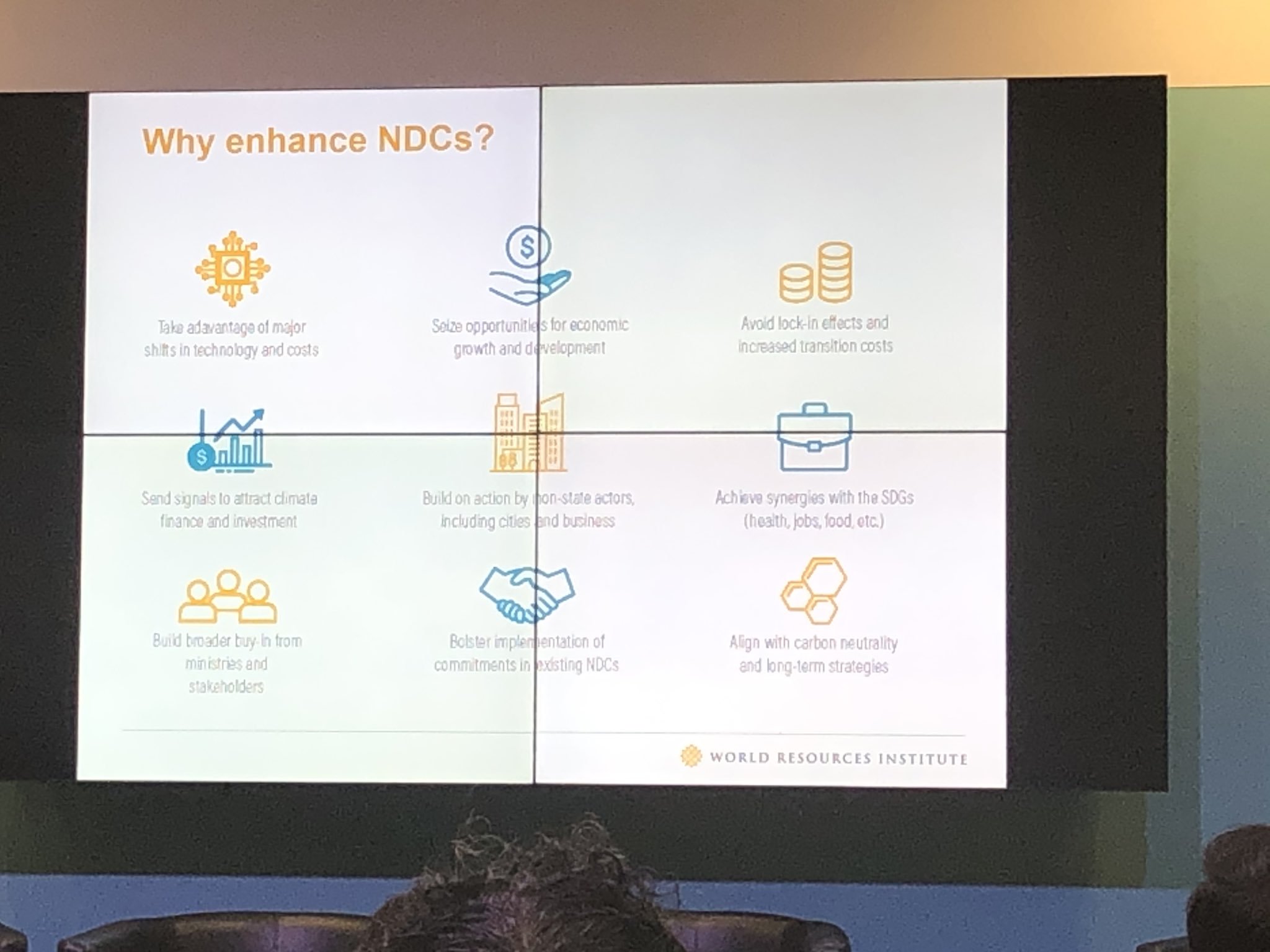 Why enhance NDCs? A focus on opportunities, avoiding lock in effects, taking advantage of new technology, most importantly, seizing the opportunity for economic growth and development that the NDCs represent.
Why enhance NDCs? A focus on opportunities, avoiding lock in effects, taking advantage of new technology, most importantly, seizing the opportunity for economic growth and development that the NDCs represent.- Potential areas of focus in forests, power and transport is not surprising. “Boosting yields of crops and livestock through sustainable intensification can reduce emissions per unit of good produced and greatly relieve pressure on the world’s remaining forests.” This line in agriculture is important highlighting the synergy between adaptation and mitigation in agriculture, the start of real adaptation action.
- Session on generating trust in carbon markets, insights from research. Aim of carbon markets is to make emissions reductions cheaper which should support ambition in NDCs.
- Challenges observed under Kyoto include considerations of additionality which can differ between countries, perverse incentives, and system gaming in many guises. Need to make sure problematic units from Kyoto are not carried forward.
- A stringent baseline does not always stop additionality, building a list of technologies is a challenge as the list is static and economics are dynamic, further it is possible to game the system, so auditors need to play a bigger role. A single mistake can be multiplied.
- Markets need to drive reductions in emissions, not just allow emissions in one place to be offset elsewhere. We need a real reduction in emissions not just have something on paper which makes no difference to the atmosphere.
- Bridging the Fossil Fuel Gap moderated by @SEIclimate, hearing from the NZ Climate Change Division about a just transition from fossil fuels for a region in NZ. Looking at people and jobs, innovation in new energy, also facilitating private sector investment in hydrogen. Importance of innovation, economic diversification and engagement with peoples. Well being of all New Zealanders is central to this process. The just transition process will be extended to sectors beyond fossil fuels.
- UNEP Climate Change Coordinator highlighting the size of the challenge, 7.6% reduction year in year. Phasing out fossil fuels is central to achieving this. Need to start to forecast this in NDCs and include it in policy. UN Secretary General Special Envoy comments, reduce subsidies to fossil fuels and direct taxes to the right place. Will be increasing pressure on G20 members to attend to this. Would also like to understand what the options are for governments, industries and workers.
- Adaptation and NDCs, including adaptation in NDCs is voluntary but most countries include it. National Adaptation Plans are for around 30 years of planning, so they are long term. Biennial Transparency Reports allow countries to disclose what has changed every 2 years. NAP has been included to give adaptation the focus it requires relative to mitigation.
- Stocktake report on buildings and emissions to be launched next week by UCL and its CREDS research division.
- NDCs are a good opportunity to drive efficiency in buildings forward. Note new publication Business models for green buildings: real estate actors around the globe show the way (Programme for energy efficiency in buildings- PEEB) which is available for download.
Day 1 - Monday 2 December, 2019
- Listening to the #IETA discussion on Article 6 really makes me think that in the final negotiations there is going to be a trade off between double counting of offsets and parties being able to carry over Kyoto credits. There may be more emphasis on eliminating double counting.
- Is it still the case that no deal is better than any deal? We need to arrest emissions in the next 10 years, anything that puts this at risk is not tenable. One of the opinions from the panel, not sure it’s held by all
- The bottom line is that we don’t want to spend the next 10 or 15 years trying to fix what we got wrong. There is not black or white in this area. Negotiators are not expecting to sleep much.
- Is there a role for the purchaser to be pickier about what they buy as opposed to getting the rules completely right. Much of the private sector doesn’t want to buy offsets that are double accounted, even without the rules being right we might get the outcomes we need
- The Chilean president of the COP opening the session and calling for real action on climate change. Joined by Christina Espinosa, Antonio Guiteras, and Nancy Pelosi on the stage. Looking forward to successful conclusion of Article 6 negotiations. #COP25 #TimeForAction
- President of the IPCC “we are in crisis” we are increasingly reaching the limits of adaptation, there is an immediate need to curtail emissions
- The world will suffer from stranded assets, food security will be threatened, financial institutions face increasing uncertainty
- Many adaptations pathways are feasible under low emissions pathways only, we need an immediate and urgent change in trajectory. Look out for two new reports from IPCC later this week, on land and oceans
- We are not doing anywhere near enough to address climate change
- This would have been a boring COP if is wasn’t for the need to resolve Article 6. First BINGO briefing of the COP. Still@some challenges in transparency etc, but Article 6 is one step behind on negotiations. This is the most challenging task for this COP. #COP25 #TimeForAction
- The other task of this COP is to set up the work for COP26 at which parties are expected to increase their ambitions in NDCs.
- We are pretty much in the same position on the negotiation of Article 6 as we were in Katowice, the only difference is that the parties understand each other’s positions, and may be better informed. The same issues from Katowice remain to be solved.
- Follow the progress of negotiations through the SBSTA sessions in the first week where technical aspects will be negotiated. Expecting a first draft on Wednesday and a second on Friday. Expecting an additional 2 days of negotiations for Article 6.
Related insights
-
COP25: all eyes on Article 6 negotiations
READ MORE -
IEA World Energy Outlook 2019: analysis and implications for Australia
READ MORE -
Australia’s emissions to 2030 and beyond to 2050
READ MORE -
Climate risks and the bottom line: who should lead a business’ response?
READ MORE -
“Can you draw a map that shows where my business needs to be by 2050 in a world…
READ MORE -
Protecting (and creating) business value by addressing climate risk
READ MORE

